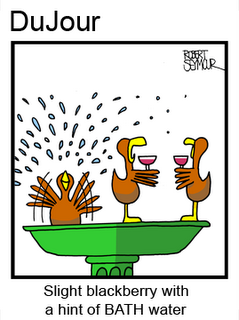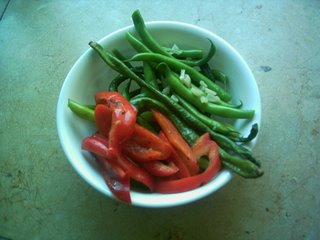
The other day, walking on the beach, a horde of enthusiastic youngsters with matching teeshirts pounced on me happily, chirping about a "new exciting product, here, try it". I looked behind them and saw their booth, belonging to a local mineral water company called Neviot. There were bottles, and plastic cups, and since I was very thirsty I took one and drank it up.
Gaaaah! It was sweet!
Apparently, the odd trend of flavored water has reached Israel.
As I was drinking, a strange sensation of deja vu hit me. After all, wasn't it, like, three years ago that I was accosted by a similar group of youngsters near San Francisco's Powell Station and offered a similar product? Yes, it was quite vile, even then. So now Israel has a line of peach and apple flavored water.
What is flavored water? apparently, it's somewhat of a lighter version of the juice syrups we used to have as kids, only without the food coloring. The water basically contains either sugar or an artificial sweetener and some artificial fruit flavoring, and also some added vitamins. If you are a Coke or Diet Coke drinker, this option might be better for you; but if you think (like me) that sodas taste vile and are vile, why not skip the ridiculous flavored water and drink water, instead?
The constant struggle to find new and exciting ways to quench and refresh us has yielded various interesting trends. I won't even get on the topic of sodas - there's plenty of people talking about that. There are also the sports drinks - again, much like the artificial syrups of our youth, only with the added halo of SCIENCE behind them. Sports drinks contain electrolytes and sugar, and are aimed at replenishing these particles lost in sweat, while encouraging one to drink more. "What's wrong with water?" asks one website, and answers:
Drinking plain water causes bloating, suppresses thirst and thus further drinking. It stimulates urine output and therefore is inefficiently retained. A poor choice where high fluid intake is required. Water contains no carbohydrate or electrolytes.
Yes, water does "cause" bloating. Anything ingested will make stomach expand as it takes some time to absorb. Yes, consuming liquids "stimulates urine output", as they are supposed to; the kidneys and bladder do their job for a purpose. This might, perhaps, be tricky for marathon runners, but for us simple folk there's really nothing better than good quality water. "Flavored water" is not much different from the fake juices of our childhood. Yes, it doesn't have coloring, possibly to make it seem more healthy (which it probably is, to some extent). But the flavor is still there. Want to ask yourself what it's doing there?
It seems that food manufacturers do not believe that we'll drink anything unless there's some sugar and added ingredients to it. Do pour yourself a glass of good water and prove them wrong.


